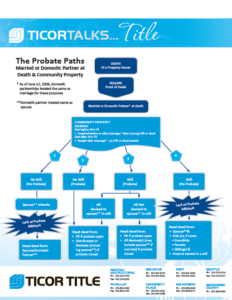Our previous probate path blog post discussed the sad tale of Sam Smith, who died with no kids, and the happy tale of Rolf, his nephew and sole heir who discovered that he had the proverbial “rich uncle.”
Three Basic Probate Situations
As noted in the December 6th blog, there are three basic probate situations:
- The owner was single – not married or a domestic partner
- The owner was married or a domestic partner and it was community property
- The owner was married or a domestic partner, but it was separate property (not community property)
There are variations: did the deceased have a will? Is the estate being probated (with or without a will)?
Today we talk about another probate situation, this time involving community property.
A sudden passing with no will
Shelley and Norma are domestic partners, and live in a home that they bought together in 2009 (see the August 2011 blog post, “Domestic Partnership Law in Washington State” where community property laws apply to both a married couple and domestic partners). Shelley has two children, Albemarle and Adelaide, from a previous marriage. They also adopted a child together, Angelina.
Sadly, Shelley passed away from a sudden illness. She did not have a will. The question arises – who gets the house? Is it just Norma, or can Albemarle and Adelaide claim an interest, perhaps forcing a sale of the home in order to get their share? What about little Angelina?
This is a basic community property situation, and Norma inherits the house, free of any claims by Albemarle or Adelaide, and it becomes her separate property. When her time comes (assuming she doesn’t sell the house, get married or enter into a new domestic partnership before then), only Angelina would inherit from her.
“…the children don’t come into play when either parent dies – only when the surviving parent later dies.”
Now, if Norma had died first, the same rule would apply – that is, Shelley would get the house as her separate property. However, when she passes away, Albemarle, Adelaide and Angelina would all inherit the house. In any case, the children don’t come into play when either parent dies – only when the surviving parent later dies.
Determining who is in title
But we are getting ahead of ourselves. Right now, a Realtor® is listing the house for Norma, and the title company has to decide who is in title and who would need to sign a deed. If there isn’t a lot of money at stake a probate probably wouldn’t be necessary, so a “lack of probate” affidavit is the starting point.
Most community property situations are pretty straightforward, because when two parents own the home as community property it passes directly to the surviving spouse when one passes away, and their kids will end up with it eventually anyway. The chart to the right shows how the title company would proceed to identify who must sign the deed. As in Shelley’s case, with no probate for what is clearly community property, the Probate Path No. 1 is followed.
To view the probate path chart click here. (a PDF will open in a new window)
Complications may arise
However, complications can arise when there are children from a previous marriage, and it may not be so simple for the title company. For example, Albemarle and Adelaide could raise a fuss, and even though it is apparent that Norma inherits the house, the title company may want to get a deed from them. Why might they want to make a claim? Well, Shelley could have inherited the house, in which case, even though that happened in 2009, it would be her separate property, and Norma could be out of luck. Or, maybe Shelley paid the entire purchase price with inherited money, in which case her heirs could argue it was her separate property because separate funds were used to buy it. But let’s add another wrinkle – maybe Shelley contributed the down payment from separate funds, but Norma made the mortgage payments. She might claim an interest – perhaps a “marital” lien, saying that some of the equity value was acquired by her for the value of what she paid. Albemarle and Adelaide could be anything from the sole owners to part owners to having no interest at all.
Lack of probate affidavit
Hopefully, all the complications would be identifiable in the “lack of probate” affidavit. Of course, Norma could open a probate for Shelley (especially if there was a will), and no matter what Albemarle and Adelaide would claim, the probate court would deal with it. The title company would follow either Probate Path No. 3 or 4, and a deed from the personal representative in the probate would be sufficient.
To download a printable version of the probate path chart, click this link: probate path infographic.

